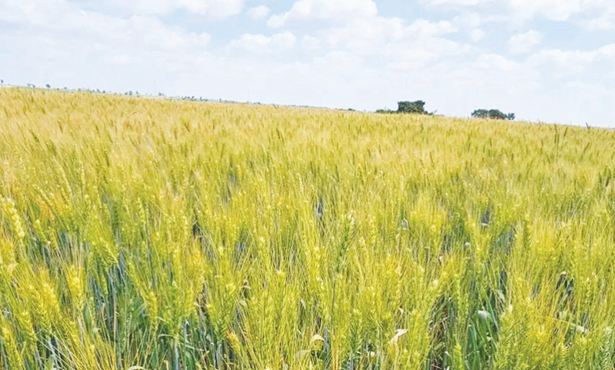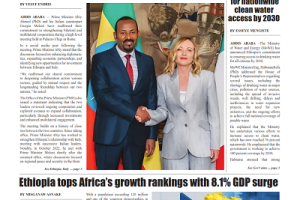
Ethiopia has vast and fertile land for agriculture and a large amount of water resources for cultivation. According to agricultural experts, with these two important natural resources and a suitable climate for growing various crops, it is regrettable and even worse for the country looking for helping hands as it is unable to reliably ensure its food security.
In recent years, the government has been focusing on ensuring food security, especially on summer agriculture, and has been introducing new work habits to farmers, which has led to increased production and productivity. This has shown encouraging changes. The Ethiopian Press Agency (EPA) approached experts in the field seeking explanation for the question what is to be done to sustain the change and further increase productivity.
According to Tadesse Kuma (PhD), Head of Agriculture and Rural Development at the Policy Research Institute, Ethiopia is not satisfied with its policies in terms of land administration, management and use of natural resources. Although its policies are working, traditional land resource management practices are still observed everywhere because they have not been implemented on the ground.
Among the natural resources that are crucial to the development and progress of a country, water and land occupy the first place. Land has its own characteristics that can be used for various purposes depending on the composition of the soil it contains and its location. It can be used for agriculture, animal husbandry, industry, forestry, irrigation, grazing and mining among others.
Tadesse said; “Change does not come simply because we have resources; it comes when institutions and people in the institutions or relevant parties are able to translate the policy into action. That is when we use our land and water resources properly; we can overcome the threat of food shortages; and we can help others.”
According to Professor Berhanu Kebede (PhD), a lecturer in the Department of Civil and Water Engineering at Bahir Dar University, Ethiopia is a country blessed with land and water resources; in particular, its water resources are its greatest blessing, which other countries are not blessed with and are more valuable than oil. However, due to its limited experience in cultivating land and developing water, it has not been able to fully utilize its resources for centuries. Until now, it has been struggling to fully utilize its natural resources due to its lack of understanding of what it has and making use of what it learned about its blessings. “If Ethiopia needs to fully utilize its resources, we, its citizens, must first change our mindset.” He also recommended, “We have to work with modern methods and technologies.”
According to Dr. Berhanu, water-related works need to be professionally supported and follow a scientific approach. He said that the process conducted so far has put the country backward due to its failure to utilize the methods and technologies used in the sector.
In particular, he explained that Ethiopia has paid very little attention to its water resources and that it has not invested in them in line with the amount of resources it has. He mentioned that in recent years, initial efforts have been made to use water for electricity generation and summer agriculture; and he added that the work done is still very limited considering the vast resources available.
While proposing a solution to this problem Dr. Tadesse said; “Although we have water and land resources that allow us to benefit ourselves and others, we have not properly utilized the land resources, especially in the lowlands. We need to complete the water infrastructure in the areas to utilize this resource.”
As to him, it is essential to expand irrigation infrastructure to match the country’s vast water resources with its land resources. He added that by bringing traditional practices and ideas to a scientific method, it is possible to achieve food self-sufficiency in the agricultural sector via using technological inputs.
Dr. Berhanu, while reinforcing his thoughts, explained that doing everything scientifically is more effective than implementing everything haphazardly. Ethiopia is a country with different climates and landscapes; accordingly, the production capacity and yield of each area may vary. Especially in the summer months, studying how much water to cultivate each piece of land is available nearby is important to develop the land and the amount of water needed.
He also mentioned that the work of increasing productivity by nourishing water and land should be led by sense of belonging; Dr. Berhanu recalled that in the past, irrigation projects were built only by political decisions without having an owner, and that the establishment of the Ministry of Irrigation and Lowland Areas Development is a good start and that having an owner will create a great potential to bring about the intended change.
Dr. Tadesse further explained; “If water is not connected to soil, we cannot increase our productivity, especially by expanding summer agriculture; only if we can integrate our water and land, we will be able to go beyond self-sufficiency in food and reach the point of supplying our products to the foreign market.” Since summer agriculture is a new movement, it is necessary to introduce its idea and work to every farmer and create an opportunity for everyone to connect the water resources in the area with the land and increase productivity.
Dr. Berhanu said that it is crucial to work to preserve and protect the nation’s existing water and land resources by connecting water resources with the land and increasing production and productivity. In this regard, watershed development projects and green development projects are very useful for preserving natural resources and preventing climate change.
He further explained that if the positive contributions of the works done so far can be assessed and their continuity ensured, the plan for food self-sufficiency can be realized by increasing productivity while conserving water and land resources.
Tadesse on his part explained that the highlands and plateau areas of Ethiopia are mostly used for agriculture; however, the lowlands and barren areas are used for agriculture to a certain extent; especially in the lowlands, it is unreal to talk about food shortages if it is possible to work with a strong institutional structure in irrigation and there is no reason why it cannot be effective.
He said; “We should look at the path we have gone so far in terms of land and water use and fill our shortcomings and work for better results.”
BY BACHA ZEWDIE
THE ETHIOPIAN HERALD WEDNESDAY 19 MARCH 2025





